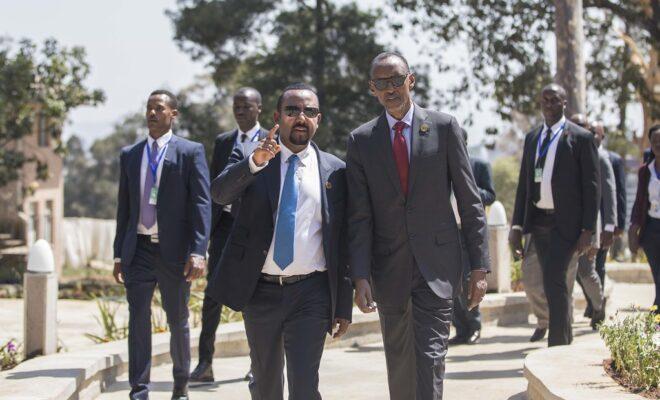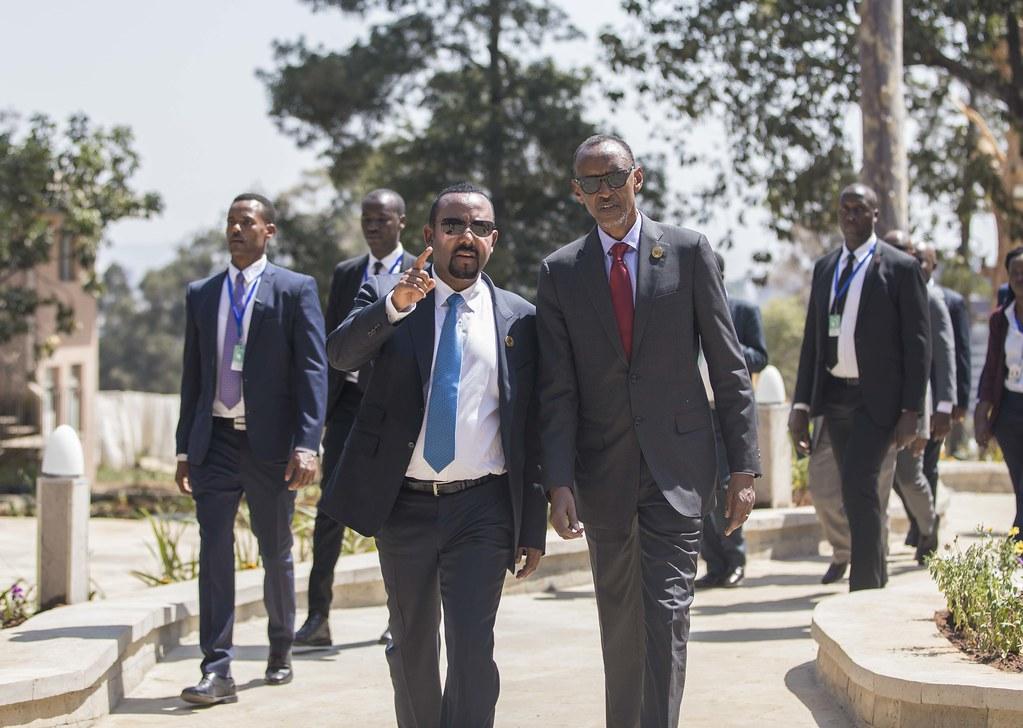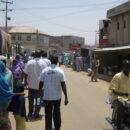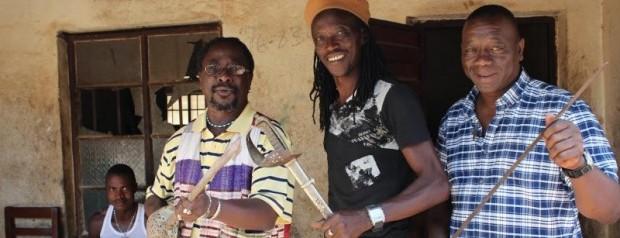More questions than answers: Whither Ethiopia’s transition?

Ethiopia’s democratic transition was already precarious. Two developments have made it even more uncertain.

Prime Minister Abiy Ahmed (left) with President Paul Kagame (right) in February 2020. Credit: Paul Kagame.
When Abiy Ahmed became Ethiopia’s prime minister in April 2018, his arrival was greeted with a collective sigh of relief both in Ethiopia and abroad. The new leader was seen as a reformer who would change the course of the ruling Ethiopian People’s Revolutionary Democratic Front (EPRDF). In power since 1991, the governing coalition had turned the country into an African economic powerhouse but also been exerting growing authoritarianism.
Hopes were high and Abiy enjoyed some early praise. He was awarded the Nobel Peace Prize for making peace with Eritrea. His reforms in the judiciary marked an encouraging leap forward. And many of his early political actions were cautiously welcomed.
Yet change remained elusive in many other areas. The Ethiopian army, for instance, has continued to be accused of human rights violations, most recently in Oromia region. Meanwhile, the Bertelsmann Transformation Index (BTI) 2020 country report on Ethiopia, concluded: “The new political leadership changed its attitude towards civil society participation, but up to now there is no institutionalisation of state-civil society dialogues visible.”
Two recent developments in particular have made Ethiopia’s fragile transition under Abiy even more precarious.
Election delay sparks fierce debate
The first is that COVID-19 has made matters even more combustible. Most significantly, the pandemic has led Ethiopia’s highly anticipated general elections to be postponed – initially to August but now indefinitely.
That ballot had been seen as an important milestone in Ethiopia’s democratic transition. For many previously sidelined parties, the 2020 vote was to be their first interaction with voters to whom they had been denied access to for nearly three decades.
The delay has also set in motion a fierce constitutional debate. Ethiopia’s constitution stipulates that legislative elections take place every five years. Any ruling party that overstays its mandate is automatically rendered illegal. This raised questions over how the government and opposition should navigate the impasse.
Many Ethiopians, including some of the country’s top constitutional scholars, pleaded with the ruling party to engage in a national dialogue with all opposition parties and other stakeholders to forge a path forwards. Instead, Abiy took the issue to Parliament, which is completely controlled by the EPRDF, to seek a constitutional interpretation.
Parliament, in turn, referred the decision to a Council of Constitutional Inquiry (CCI). Led by Chief Justice Meaza Ashenafi, the body approved the indefinite extension of federal legislative term limits until after COVID-19 is no longer deemed a threat to public health. Even more dangerously, the CCI also went beyond its constitutional mandate and extended the legislative term limits of regional states, which are independent of the federal government.
Tigray regional state, already at loggerheads with the federal government, was the first to reject this decision. In an unprecedented move, the regional government announced it would hold its own election unilaterally before its legislators’ term limits expired. Prominent opposition leaders also criticised the move, accusing Abiy of using the judiciary to illegally extend his term in office. The political atmosphere rapidly deteriorated, leading the prime minister to issue a stern warning and even float the option of using force to safeguard the constitution and country.
Political assassination sparks violence
A second development that has increased uncertainty in Ethiopia is the assassination of Hachalu Hundessa in June. The musician and activist was loved across the country but revered by the Oromo people. His killing by unknown assailants sparked violence that exposed how Abiy’s government has long since exhausted its options in trying to create a stable political order.
The night Hachalu was shot in Addis Ababa, the Oromia region went up in flames. Initially, crowds gathered to express their sorrow and anger against the musician’s killing, but soon this turned into attacks against minorities as well as other civilians including Oromos. According to the government, more than 160 people were killed in the attacks and the ensuing response by security forces. In cities like Shashemene, one of the region’s business hubs, significant areas were reduced to ashes.
The government responded to the violence by arresting over 7,000 people and detaining several journalists, activists and opposition figures such as Jawar Mohammed, who had initially helped Abiy consolidate power but later became a fierce critic. The government also shut down at least four media houses and blocked the internet for 23 days. In this period, the Attorney General’s office pushed the state media to broadcast its findings on the Hachalu’s assassination, which blamed it on the Oromo Liberation Army, a rebel group, and the Tigray People’s Liberation Front (TPFL), a constituent party in the EPRDF coalition.
Questions without answers
What will happen next? How, if at all, can Abiy steer Ethiopia towards a stable political order without meaningful dialogue to resolve the impasse? Where is the troubled relationship between Tigray state and the federal government headed? How can the prime minister stabilise the most troubled and agitated state, Oromia, after jailing almost all opposition political leaders?
This questions all need urgent answers that will determine the nation’s fate. Yet through its propaganda, use of the state media and heavy-handed law enforcement, Abiy’s government has seemingly managed to sedate urban Ethiopians and foreign backers into a wilful paralysis from asking them. This, however, has sucked Ethiopia into a vortex of the unknown, leaving more questions than answers.
A version of this article was first published on the Bertelsmann Stiftung’s BTI Blog.






Abiy’s Regime Is Perhaps Most Frustratingly Slow In Using State Powers When It Is Necessary To Impose Law And Order and yet there are those that are egging him on to use brute force on such nefarious and clearly violent forces such as Jawar Mohammed’s followers and TPLF’s degenerates. The International Media Chooses not to call these forces out for what they are but instead are looking for the “usual” African Authoritarian Regime even when there is none.
My Sister Tsedale,
Hope is still high. In two years only, no one would do a fraction of what PM Abiy did. Abiy is cleaning the suffocated Ethiopian political space and obviously TPLF and OLF extremists are trying to smear the reform for the outside wold but 90% + Ethiopians are happy with the reform.
Be patient!
The piece is interesting and cautiously noted on ABIY AHMED DICTATOR REGIME.
The writer is deliberately hideout important information because her political view. “…but soon this turned into attacks against minorities as well as other civilians including Oromos.” Who’re those minorities?! Those minorities are mainly Amharas in Oromia region. They’ve been labelled as “settlers” in Oromia region. The minorites were slaughtered and their house burnt in the day light. Why Oromos?! because they’re Orthodox Christians.
I’m hoping that’s a typo in the title – whither not wither? 😉
I Left A Comment Yesterday But I Dont See It. Intentional?
In the title, it should be “whither” (=where) not “wither” (=shrink and decay)
Instead of English publication, it should say an English language publication.
From the tongues of the Liar, Abiy Ahmed, slipped (1) election is a luxury–there are many countries who never did it for 30-40 years (2) he is 7th king–a God-elect King who rules Ethiopia till his death
I read Tsedale’s piece with interest, considering her role as an editor of Addis Standard which, in the main is one of the few reasonable news outlets that cover events in Ethiopia.
Tsedale starts out by saying that when Abiy became PM there was a sigh of relief at home and abroad because ‘he was seen as a reformer who would change the course of the ruling EPRDF’. In my view disappointments and or questioning of Abiy’s regime emanates from this false hope engendered with Abiy’s ascension to EPRDF’s leadership.
Though Abiy, beginning with his teenage years grew and came to prominence within the bosoms of EPRDF his acceptance speech in Parliament had indeed made people hopeful that things might change, but not necessarily a total change of course towards democratization as some fantasized.
In as much as the change that had taken place was within the context of EPRDF (not forgetting the role mass movements in the two most populous regions and others played in bringing about the change within) and since he was an unknown quantity, one could not predict with some level of precision what was to follow, let alone talk about a transition to democracy.
To his credit Abiy, as Tsedale outlined,made a series of institutional reforms , political liberalization and peace overtures in the region and particularly a peace agreement with Eritrea that won him the Nobel Prize, that further bolstered people’s initial hope for change.
At no time however did Abiy concede the leading role the EPRDF (later PPE) was to play in what was dubbed the transitional period, despite the delusional thought of some as being co-equal, nor did the over 100 disorganized groupings who claim to be political parties help in attempting to influence the reform process by putting concerted political pressure.
As for the two recent developments Tsedale mentions making the transition more precarious,my take is as follows. The experience of elections under EPRDF in the past 29 years has convinced people that it is much ado about nothing, and the claim that the general elections of 2020 was’ highly anticipated’ is a dubious claim. As a matter of fact when the ruling party was insistent about conducting the elections in the proscribed time-frame, it was most of the vocal opposition groups that were calling for its postponement, calling instead for some nebulous dialogue or some form of a transitional government…etc But once postponement was being considered by the Election Board due to COVID 19 and associated difficulties noises started to be heard opposing it. One could say both the government and the opposition, but really mainly TPLF used the postponement to score some political points.
As for the assassination of Hachalu and its immediate aftermath, I more or less agree with her assessment, except for the fact that even within the Oromia region the mayhem and chaos was not as widespread as some claim but was limited to certain localities mainly in Arsi, Bale and Harar; this not to minimize its effects but to put it in context. As for the government’s reaction it is clear they used it as an opportunity to cleanse themselves of undesirable elements both within and without.
If there is a failure in the hoped for transition, those who projected a non-existent image on Abiy need to take the blame as much as Abiy himself.
People were exhausted with TPLF dominated EPRDF rule and Abiy’s coming to power brought about some needed relief, but whether Ethiopia is going to transition to democracy is not dependent on him for given the DNA of his political development the tendency is more towards authoritarian rule albeit a benevolent one.
This being the case it behooves all that wish for a democratic transition in Ethiopia to organize in civil society, but mainly opposition political groups to organize themselves as meaningful political organizations that have a life beyond the certificate they carry from the Election Board!
Regsrdless of his foreign backers, the oppressed people will never let him continue this way. Great sacrifices will be paid. If 90+ % population supports Abiy’s reform, why should he affraid to going to election Democratic, fair and inclusive national election is the only way out.
For two years now, the situation in Ethiopia for TPLF / Tigray has been disparagement, defamation, media vilification, political prosecution and persecution, removal from federal offices, road closures, exclusion from the so-called “peace’ with Eritrea that seems intended to “by-pass” Tigray at the border. In a statement after the regional election, TPLF leadership said that the people of Tigray have been carrying this burden with patience and grace for the sake of peace, hoping things might be improved from time to time. The regional election was peaceful and orderly, and it confirmed two things: Tigray people voted to choose their own leaders and to affirm their belief in regional self-rule within the exisitng federalism. The election also confirmed that, in addition to political leadership, the people of Tigray put their trust in TPLF to protect and defend Tigray from all the animosity and hostility all around. In Ethiopia federalism as a political order is being contested, but it is also generally understood that more people prefer federalism than otherwise.
At first we took him with his words and applauded him all along until his true picture is exposed. I personally signed petition for his nomination to the Nobel Peace Prize. Now it is clear that this person AAA, the prime minister of Ethiopia is proved to be the perfect NARCISSIST, PATHETIC LIAR AND COLDBLOODED MURDERER. He’s doing everything in his capacity to fulfill his “mother’s dream???” to become the 7th king of Ethiopia. What a looser!
Abiy,the Ethiopian primier, didn’t postponed the sixth national election but the people reprentatives do.and it was legal and by any means logical for them.
If the primier couldn’t do that decision as his and then any one can access to blame him.
Still here I didn’t see his love of the office and unstabling that nation,but the T.P.LF. power brokers are.
chloroquine cvs https://chloroquineorigin.com/# hydrochoriquine
cialis without a doctor prescription cialis price